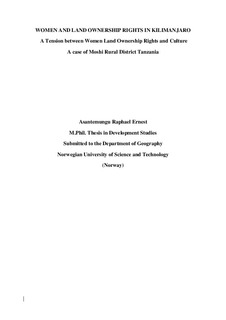| dc.contributor.advisor | Brun, Cathrine | nb_NO |
| dc.contributor.author | Asantemungu, Raphael Ernest | nb_NO |
| dc.date.accessioned | 2014-12-19T14:26:00Z | |
| dc.date.available | 2014-12-19T14:26:00Z | |
| dc.date.created | 2012-08-01 | nb_NO |
| dc.date.issued | 2011 | nb_NO |
| dc.identifier | 542513 | nb_NO |
| dc.identifier.uri | http://hdl.handle.net/11250/265379 | |
| dc.description.abstract | Despite the efforts and strategies geared towards women in realizing property rights in terms of empowerment, participation and decision making in the global context today many African societies are still characterized by social economic and political inequalities between men and women. This situation is worse in Tanzania rural areas where women land rights are violated as result of culture being regarded as a daily routine that provide the basis and ways in which land is owned and distributed.
This study focuses on women and land ownership rights. An attempt has been made to examine the contexts in which the state laws and policies give women rights to own land. With a special use of Rights based Approaches and feminist perspectives in particular WDC. The study has articulated some reasons as to why women land rights are not fully realized at a village and clan level in Moshi Rural in Tanzania.
A qualitative research methodology is the main tool for generating research materials during the research process. Emphasis in this is laid on research interviews, field observation and a study of secondary research sources has also been used in situations where it is preferred.
The study has examined the ways in which land rights for women are offered and practiced at the local level. In this regard, it is revealed that women‟s land rights are facing many challenges which are grounded in culture in the way power relations, participation and empowerment is shaped. Moreover, it is revealed that Land Laws for women which are defined by the statutory laws are facing contradictions with customary laws something which has created conflict and tension with land rights for women. In this way it has been observed that, the duty holders for rights play a limited role in helping women to realize their rights.
In addition, the task for promoting land rights in terms of advocacy and legal aid provision for women which is largely done by NGOs is facing some problems in terms of coverage. The study finds that, NGOs are town oriented while many problems for women‟s land rights rife in rural areas. This situation has made many women to have limited knowledge about these NGOs and their activities.
Moreover, the study reveals that land is the powerful means of livelihood provisions for women hence denial for women land rights has a profound impacts for their lives. For example lack for women land rights could make women to find it difficult to get food, settlement, credit and many other live necessities. This has increased the level of poverty on the part of women.
With respect to remedy the challenges and difficulties faced by women in land ownership rights, an immediate law and policy reforms pertaining land rights have been suggested, with an effort to sensitize the society about these reforms. These could go hand in hand with effective implementation of reformed laws to be practiced both at national and local level. | nb_NO |
| dc.language | eng | nb_NO |
| dc.publisher | Norges teknisk-naturvitenskapelige universitet, Fakultet for samfunnsvitenskap og teknologiledelse, Geografisk institutt | nb_NO |
| dc.title | Women and Land Ownership Rights in Kilimanjaro: A Tension between Women Land Ownership Rights and Culture: A case of Moshi Rural District Tanzania | nb_NO |
| dc.type | Master thesis | nb_NO |
| dc.contributor.department | Norges teknisk-naturvitenskapelige universitet, Fakultet for samfunnsvitenskap og teknologiledelse, Geografisk institutt | nb_NO |
